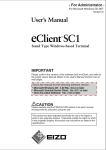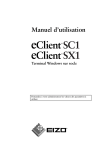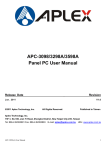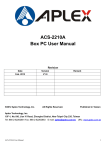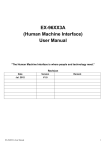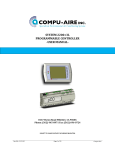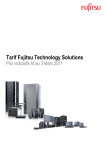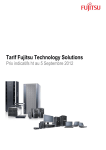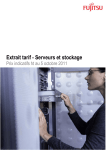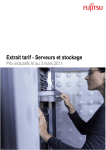Download Eizo eClient SX1 User`s manual
Transcript
- For Administrator - For Microsoft Windows XP Embedded Version A Please confirm the version of the software built in eClient, and refer to the suited User's Manual (Refer to the User's Manual Version List on next page). This is the manual for the following software version. * Microsoft Windows XP Embedded: Ver. 5.01 or later, Rev. 1.0.2 or later * Microsoft Remote Desktop Connection Software: Ver. 5.2.3 or later * Ctrix ICA Client Software: Ver. 8.0 or later User’s Manual Version List A handling description changes with versions of the software built in eClient. Please refer to below. NOTE • The version of software built in eClient can be checked with a [System] tab of [Start]- [About] menu. OS: Microsoft Windows XP Embedded Software Manual A (This manual) Microsoft Windows XP Embedded Microsoft Remote Desktop Connection Software ICA Client Software Version 5.01 or later Rev. 1.0.2 or later Version 5.2.3 or later Version 8.0 or later SAFETY SYMBOLS This manual uses the safety symbols below. They denote critical information. Please read them carefully. WARNING Failure to abide by the information in a WARNING may result in serious injury and can be life threatening. CAUTION Failure to abide by the information in a CAUTION may result in moderate injury and/or property or product damage. Indicates a prohibited action. Indicates to ground for safety. Copyright© 2004 EIZO NANAO CORPORATION. All rights reserved. No part of this manual may be reproduced, stored in a retrieval system, or transmitted, in any form or by any means, electronic, mechanical, or otherwise, without the prior written permission of EIZO NANAO CORPORATION. EIZO NANAO CORPORATION is under no obligation to hold any submitted material or information confidential unless prior arrangements are made pursuant to EIZO NANAO CORPORATION's receipt of said information. Although every effort has been made to ensure that this manual provides up-to-date information, please note that EIZO monitor specifications are subject to change without notice. ENERGY STAR is a U.S. registered mark. Apple and Macintosh are registered trademarks of Apple Computer, Inc. DPMS is a trademark and VESA is a registered trademark of Video Electronics Standards Association. VGA is a registered trademark of International Business Machines Corporation. Windows is a registered trademark of Microsoft Corporation. ScreenManager and PowerManager are trademarks of EIZO NANAO CORPORATION. FlexScan and EIZO are registered trademarks of EIZO NANAO CORPORATION. Sun, Sun Microsystems, and the Java logo are trademarks or registered trade marks of Sun Microsystems, inc. in the United States and other countries. As an ENERGY STAR® Partner, EIZO NANAO CORPORATION has determined that this product meets the ENERGY STAR guidelines for energy efficiency. 3 TABLE OF CONTENTS 1. INTRODUCTION ..................................................................................... 5 1-1. General Description ......................................................................................5 1-2. Features ........................................................................................................5 1-3. Package Contents..........................................................................................6 1-4. Controllers & Connectors ............................................................................7 2. CONNECTION the eClient SX1 ............................................................. 9 2-1. Setting up the SX1 ........................................................................................9 3. OPERATION ......................................................................................... 15 3-1. Adding a Connection name.........................................................................15 3-2. Logging on or off the WTS .........................................................................20 3-3.Opening/Closing the Local Web Browser.....................................................24 4. Setup the environment of the operation (by the System Administrator) . 25 4-1. Note for the SX1 system environment ........................................................25 4-2. Log on to the SX1 as the System Administrator..........................................26 4-3. “User” authority and “Administrator” authority .......................................28 4-4. Using the control panel ...............................................................................30 4-5. [Start]-[About] menu ..................................................................................37 4-6. Software updating/Installation ....................................................................38 5. TROUBLESHOOTING........................................................................... 39 6. CLEANING............................................................................................ 40 7. SPECIFICATIONS................................................................................. 41 4 TABLE OF CONTENTS 1. INTRODUCTION Thank you very much for purchasing the EIZO eClient SX1. 1-1. General Description The SX1 is used as a thin client, which connects to the terminal service installed Windows Terminal Server (Hereafter defined WTS) as listed below and accesses applications or data provided from the WTS. • Server (WTS: Windows Terminal Server) Microsoft Windows 2000 Server / Advanced Server / Datacenter Server Microsoft Windows Server 2003 Standard Edition / Enterprise Edition / Datacenter Edition Windows Terminal Server (WTS) Network eClient SX1 Output data of applications Input data from keyboard/mouse/ stylus · Operation of applications · Storage of data ⋅ Display data ⋅ Operation by keyboard/ mouse 1-2. Features • Lower TCO (Total Cost of Ownership) • Saves Space and Power Consumption • Less Heat, Less Noise • SX1: Windows XP Embedded • Serial Port for Modem/PDA (*Hayes AT compatible modem supported) • 2 USB downstream ports (SX1: Standard Rev. 2.0) • Local Web Browser added as a default connection • PC card slot for modem card or LAN card • Wake on LAN supported • Network utility software, “Network Administrator Version 3.0” supported • Two installation types; EIZO Monitor mounted / Stand alone • EIZO Monitor detachable stand type 1. INTRODUCTION 5 • Secondary power switch (wired) 1-3. Package Contents Please contact your local dealer for assistance if any of the listed items are missing or damaged. Please make sure that all the items listed are in the package. • SX1 • Mouse (FDM-LCS1) • Power Cord • Switch Box (1.8 m) • Signal Cable (FD-C29) (50 cm) • User’s Manual • Monitor Attachment Unit: for mounting monitor *1 • Power Cord (50 cm): for mounting monitor*1 • Clamp for cables: for mounting monitor*1 *1 The monitor attachment unit, the power cord, and the clamp for cables are used when attaching a monitor in SX1. Installation of a monitor should follow the system administrator. NOTE • A keyboard is not included. It must be purchased separately. • Please use the enclosed mouse. EIZO NANAO CORPORATION will no be held responsible for accident or damage caused by the use of a mouse manufactured by other companies. • We recommend that you retain the original packing materials in case of future need. 6 1. INTRODUCTION 1-4. Controllers & Connectors Controllers Left View Right View Po we r SY NC OF ON F (5) AC OUT PU T AC INPU T (3) (1) (2) (4) (1) Power Button (2) Power Indicator Power Indicator Blue * SX1 used as an example State of the unit • Operation mode • Screen saver is active *1 • No picture is displayed on the monitor *1, *2 Off *1 *2 Power is off (Wake on LAN standby) [Procedure to return to the operation mode] - Operate the mouse or keyboard. The monitor is in the power save mode when the power save function of the monitor is set. (3) Connector for Switch Box*3 (4) Switch Box*3 (5) Power Supply Control Switch (POWER SYNC) *4 *3 The secondary power switch makes it easy to turn the SC1 / SX1 on and off when stowed away under the desk or out of reach. When the enclosed switch box is connected to the connector, it can be used as a power button. The power button on the SC1/SX1 can be used simultaneously even if the switch box is connected. *4 Please refer to pg. 12 for details on the power supply control switch (POWER SYNC). NOTE • When turning off/on the unit, leave the unit off for a few seconds before turning it on again. • Do your part to conserve energy, turn off the unit when your finished using it. Complete energy use can only be stopped by disconnecting the unit from the power supply. 1. INTRODUCTION 7 Connectors Pow (1) er SY NC OFF (6) ON AC (2) (3) OU TP UT AC INP UT (7) (4) (8) (9) (5) (10) (11) (12) (1) (2) (3) (4) (5) (6) Power Supply Control Switch (POWER SYNC)…Same with (5) on P.7 Power Connector (AC output) Power Connector (AC input) Ethernet Connector (10 Base-T, 100 Base-TX) Parallel Connector Headphone Connector Microphone Connector (7) PC Card Slot (8) USB Port (Downstream) x 2 (9) DVI-I Output Connector (10) Serial Port (RS-232C) (11) Mouse Connector Keyboard Connector (12) Security Lock*1 *1 8 This allows for connection of a security cable. This lock supports Kensington’s MicroSaver security system. For further information, please consult: Kensington Technology Group 2855 Campus Drive, San Mateo, CA 94403 USA Tel: 800-650-4242, x3348 Intl: 650-572-2700 Fax: 650-572-9675 http://www.kensington.com 1. INTRODUCTION 2. CONNECTION the eClient SX1 This chapter explains how to connect the SX1 to a WTS. 2-1. Setting up the SX1 Please observe the following cautions when connecting the SX1. WARNING Place the eClient SX1 on a strong, stable surface. A unit placed on an inadequate surface may fall, resulting in injury or equipment damage. If the unit falls, disconnect the power immediately and have the unit checked by a qualified service engineer before using it again. Using a unit after it has been dropped may result in fire or electric shock. OK Set the unit in an appropriate location. Not doing so may result in fire, electric shock, or equipment damage. * Do not place outdoors. * Do not place in the transportation system (ship, aircraft, trains, automobiles, etc.) * Do not place in a dusty or humid environment. * Do not place in a location where the steam comes directly on the screen. * Do not place near heat generating devices or a humidifier. The Monitor Attachment Unit supports only EIZO L767, L567, L557, L367. Mounting other monitors to the unit may result in injury or equipment damage. Contact your system administrator for details of the attachment. * The illustrated monitors in this section are L567. Monitors are not included in the package. Maximum load capacity of AC outlet is 2 A. Connecting unit with more than 2 A may result in fire, electric shock or other damage. 2. CONNECTION the eClient SX1 9 Mounting EIZO monitor to the SX1 When using other monitors than EIZO, proceed to step 3. The Monitor Attachment Unit of SX1 supports the EIZO L767, L567, L557, and L367, so EIZO monitor mounted SX1 is available. NOTE • Prepare the following, when mounting a monitor to the SX1. Monitor L767, L567, L557, L367 Screws The screws used for the monitor original stand Power Cord Power Cord (50 cm) which is included into the SX1 package. Mounting EIZO monitor procedure Step 1. Attach the monitor attachment unit to the monitor. Step 1 Monitor Attachment Unit Step 2 Step 2. Po we r SY NC OF F ON AC Mount the monitor to the SX1. PO QO O| O| PQ QS Ou TP O u ‘ ‘ Q ‘ UT Q‘ OU AC INPU T 1. Attach the monitor attachment unit to the monitor. (1) [1] Hold the center of the cover of the monitor attachment unit (upper side and bottom side) and [2] slide them rightward or leftward to remove the covers. [2] [2] [1] [1] 10 [1] 2. CONNECTION the eClient SX1 (2) Lay the LCD monitor down on the soft cloth or cushion not to scratch the panel surface. (3) Remove the original stand by loosening the screws. (4) Attach the monitor attachment unit to the monitor securely, by using the screws, which used for the original stand. 100 mm x 100 mm for L567/L557/L767 75 mm x 75 mm for L367 (5) Get back the cover to the monitor attachment unit. 2. Mount the monitor to the SX1. (1) Fit the protruding portion of the monitor attachment unit (4 points) to the attachment position of SX1 (4 points), and insert it in downward, by pressing down the knob of the monitor attachment unit into the knob position of SX1. NOTE • Monitor mount positions SC1 has three attachment position (Highest position, Middle position and lowest position). Please be sure to attach in each position as follows. • Refer to the P. Error! Bookmark not defined. for the dimensions figure according to monitor size. Knob position Highest position Middle position Lowest position (2) Grip both side of the monitor firmly with both hands and adjust the monitor angle as desired. 2. CONNECTION the eClient SX1 11 Connecting the signal cable and power cables 3. Plug the signal cable into the connector at the rear of the monitor and the other end of the cable into the video connector on the DVI-I connector of the SX1 4. After connecting, secure the connection with the screw-in fasteners. 5. Plug the power cord (50 cm), included into the package, into the power connector on the rear of the monitor and the other end of the cable into the power connector (AC outlet) of the eCleint, or into a power outlet. WARNING Use the enclosed power cord and connect to the standard power outlet of your country. Be sure to remain within the rated voltage of the power cord. Not doing so may result in fire or electric shock. The equipment must be connected to a grounded main outlet. Not doing so may result in fire or electric shock. Maximum load capacity of AC outlet is 2 A. Connecting unit with more than 2 A may result in fire, electric shock or other damage. Power Supply Control Switch (POWER SYNC) When the monitor's power cord is connected to the AC output power supply of SC1/SX1, the monitor’s power supply can be linked with on/off of SC1/SX1. Choose ON from the power supply control switch (POWER SYNC). When the power button of SC1/SX1 is turned on or off… 12 Power Supply Control Switch (POWER SYNC) Power supply for the monitor ON The monitor’s power supply is linked, and it turns on or off simultaneously. OFF (default) Since the monitor’s power supply is not linked, please turn the monitor's power supply on or off independently. 2. CONNECTION the eClient SX1 NOTE • Bundling cables After all connection has been made, please bundle the cables with the clamp included into the package, so that the cables do not obstruct the paths as follows. • Clamp installation Po we r SY NC OF F ON AC AC PO QO O| PQ O OU | Q S O u ‘ TP O u ‘ Q ‘ UT Q ‘ IN PU T Connecting the peripheral devices to SX1 NOTE • Before connecting the SX1, confirm the following: - The SX1 is turned off. - The WTS is turned on. • Connect the peripherals to the appropriate connectors of the unit. 6. In case of connecting the WTS through LAN: Connect the SX1 to the network with an Ethernet cable. In case of a dial-up or dial-in connection: Connect the SX1 to a modem or a modem card. NOTE • Please remove the lid on the side of the SX1 before connecting a LAN card or a modem card. 7. Plug a keyboard and a mouse into the SX1. 8. When using other devices, connect them to the appropriate connectors. 2. CONNECTION the eClient SX1 13 9. The switch box is connected to the attached connector for Switch box on the SX1 if needed. The secondary power switch makes it easy to turn the SX1 on and off when stowed away under the desk or out of reach. When the switch box is connected to the connector, it can be used as a power button. The power button on the SX1 can be used simultaneously even if the switch box is connected. 10. If using other devices, please connect them to the appropriate connectors. 11. Plug the power cord into the power connector. If the power cord is connected to a power supply wall socket, regardless of ON or OFF operation of the power button, eClient SC1/SX1 will starts up. NOTICE • Note that the SX1 also starts up whenever electric power is intercepted from power failure or master power shutdown, and power supply is restored after that. WARNING Use the enclosed power cord and connect to the standard power outlet of your country. Be sure to remain within the rated voltage of the power cord. Not doing so may result in fire or electric shock. The equipment must be connected to a grounded main outlet. Not doing so may result in fire or electric shock. NOTE • The screen, which SX1 can display is as follows. Analog Output 640 x 480 @60 Hz Digital Output 16 bbp 640 x 480 @60 Hz 32 bbp 800 x 600 @60 Hz 16 bbp 32 bbp 800 x 600 @60 Hz 32 bbp 1024 x 768 @60 Hz 16 bbp 16 bbp 32 bbp 14 2. CONNECTION the eClient SX1 16 bbp 32 bbp 1024 x 768 @60 Hz 32 bbp 1280 x 1024 @60 Hz 16 bbp 16 bbp 32 bbp 1280 x 1024 @60 Hz 16 bbp 32 bbp 3. OPERATION This chapter shows how to start and end SC1/SX1 operation. 3-1. Adding a Connection name When using the RDP protocol 1. Turn on the SX1. 2. The Desktop screen will be displayed. 3. Star the [Remote Desktop Connection]. Double click the [Remote Desktop Connection] icon to open the [Remote Desktop Connection] dialog box. Click [Start]-[Remote Desktop Connection] to open the [Remote Desktop Connection] dialog box. Click [Start]-[Program]-[Remote Desktop Connection] to open the [Remote Desktop Connection] dialog box. 4. The [Remote Desktop Connection] will be displayed. Enter the name of the computer and click [Options]. 3. OPERATION 15 5. Set up connection settings of each setting tab of [Options] with reference to the setting method of Windows. 6. Name the file name and save it. (1) Click [Save As] of [Connection settings] of the [General] tab. (2) Name the file (The example is “RDP1.rdp”.), and save it. 16 3. OPERATION 7. A new icon (The example is “RDP1”) is displayed on the desktop. If a setup finishes, click [Connect] and log on to the WTS, or click [Close] and end a setup. 3. OPERATION 17 When using the ICA protocol 1. Turn on the eClient SX1. 2. The Desktop screen will be displayed. 3. Double click the [Citrix Program Neighborhood] icon to open the Citrix program. Click [Start]-[Citrix Program Neighborhood] to open the Citrix program. Click [Start]-[Program]-[Citrix]-[MetaFrame Access Clients]-[Program Neighborhood] to open the Citrix program. 4. The [Citrix Program Neighborhood] will be displayed. Double click the [Add ICA Connection]. 18 3. OPERATION 5. “Add New ICA Connection” Wizard is displayed. Set up the SX1 according to the directions of the displayed dialog box. 6. The last page of the wizard is displayed and click [Finish], a new icon (The example is “ICA1”) is added in the “Citrix Program Neighborhood-Custom ICA Connections” dialog box. 7. If a setup finishes, click [Connect] and log on to the WTS, or click [Close] and end a setup. 3. OPERATION 19 3-2. Logging on or off the WTS Logging on to the WTS 1. Turn on the SX1. 2. The Desktop screen will be displayed. When using the RDP protocol, proceed to step 3, and when using the ICA protocol, proceed to step 4. 3. When using the RDP protocol In case the connection icon exists on the desktop (1) Double click the connection icon (The example below is “RDP1”.). In case the connection name doesn’t exist on the desktop 20 3. OPERATION (2) Double click the [Remote Desktop Connection] icon to open the [Remote Desktop Connection] dialog box. Click [Start]-[Remote Desktop Connection] to open the [Remote Desktop Connection] dialog box. Click [Start]-[Program]-[Remote Desktop Connection] to open the [Remote Desktop Connection] dialog box. (3) The [Remote Desktop Connection] will be displayed. Enter the name of the computer and click [Connect]. Proceed to step 5. 4. When using the ICA protocol (4) Double click the [Citrix Program Neighborhood] icon to open the Citrix program. Click [Start]-[Citrix Program Neighborhood] to open the Citrix program. Click [Start]-[Program]-[Citrix]-[MetaFrame Access Clients]-[Program Neighborhood] to open the Citrix program. 3. OPERATION 21 (5) The [Citrix Program Neighborhood] will be displayed. Double click the connection icon (The example below is “ICA1”). 5. When the SX1 connects to the WTS, the “Log On to Windows” dialog box is displayed. Enter your [User name] and [Password], and then click [OK] to log on to the WTS. After logging on, the SX1 allows you to use the Microsoft Windows applications running on the WTS. NOTE • If an automatic logon connection is selected, this menu will not appear and you can log on to the WTS automatically. 22 3. OPERATION Logging off the WTS If your SX1 starts its operation with a desktop: 1. Log off the WTS. (1) Close all the applications. (2) Select [Start] on the taskbar. (3) Select [Shut Down...] and select [Logoff] of the [Shut Down Windows] dialog box. (4) 2. Click [OK] on the Logoff Window. The session ends and logs off from the WTS automatically. Shut down the SX1. Click [Start] and select [Shut Down…] and select the [Shut Down] of the [Shut Down Windows] dialog box. NOTE • Do not select [Stand by] to shut down the SX1. In case, [Stand by] is selected unintentionally to shut down, refer to P.36. If your SX1 starts its operation with an application: 1. Log off the WTS. Close the applications to log off the WTS. 2. Follow the step 2 of “If your SX1 starts its operation with a desktop” to shut down the SX1. NOTE • It is possible to disconnect from the WTS without closing any applications in use (or without logging off). (The last view of the application is displayed when the next connection to the WTS is made.) 3. OPERATION 23 3-3.Opening/Closing the Local Web Browser Opening the Local Web Browser 1. Turn on the SX1. 2. The desktop screen will be displayed. 3. Double click the [Internet Explorer] icon to open the browser. Click [Start]-[Internet Explorer] to open the browser. Click [Start]-[Program]-[Internet Explorer] to open the browser. 4. The local web browser opens. It is possible to browse web pages on the Internet. Closing the Local Web Browser 1. Close the local web browser. Select [Close] on the [File], or click [x] on the right upper corner of the [Internet Explorer] to close the local web browser. 2. 24 Follow the step 2 of “Logging off the WTS” to shut down the SX1. 3. OPERATION 4. Setup the environment of the operation (by the System Administrator) This chapter explains that the information on SX1 and a setup of detailed environment of operation. The “Administrator” authority performs a setup the environment. When the SX1 is turned on, it logs on automatically by “User” authority. In order to perform each setup, it is necessary to log on by the “Administrator” authority. 4-1. Note for the SX1 system environment Please note the followings as the system information of SX1. Windows update • Do not perform the “Windows Update” on the SX1. Perform the security updating by using the firmware, which EIZO will submit. Local Browser • The SX1 incorporates “Microsoft Internet Explorer 6.0”. • In order to restrict the writing to the Flash Memory (C: drive), the setting of [Internet Options] is preset. Browser cookies and cashes are restored on the RAM disk, but they are not saved. Since it has set up in order to prevent the over writing to Flash Memory, and consumption of limited Free space, do not change these pre settings. • Java Script is available. • The following Plug-in soft wares are installed as the default. 1) Microsoft Windows Media Player plug-in. 2) Java plug-in “Sun Microsystems Java 2 Runtime Environment” • If more browser resources are required, you can use another browser through a WTS. Windows Media Player • The SX1 incorporates “Windows Media Player 9.0”. • Note that the file about the skin is not installed. Utility Applications • The “Notepad (notepad.exe)”, the “Command prompt| (cmd.exe)”, “Registry editor (regedit.exe), and PING (ping.exe) is available for “Administrator” authority. These utilities can be executed from [Start]-[Run…] menu. Help • The function about Help on SX1 cannot be used. 4. Setup the environment of the operation (by the System Administrator) 25 Power save setting • Do not use [System standby] setting on the power scheme setting of the control panel, since the connection with WTS is disconnected when the SX1 shift to system standby. When the SX1 is used again, you should reconnect to the WTS (Refer to P.35). 4-2. Log on to the SX1 as the System Administrator Account information The following is the default user names and passwords, which are used for logging on to the SX1 (“User” authority and “Administrator” authority). When logging on to as the “Administrator”, once log on to the SX1 and log on again as the “Administrator”. Refer to the following steps. The user name and password is the changeable in the [Terminal Logon] icon on the control panel (Refer to P.32). Authority User name Password User User User System Administrator Administrator Administrator NOTE • Password is case sensitive. Change to the Administrator Authority 1. Turn on the SX1. The desktop screen will be displayed. 26 4. Setup the environment of the operation (by the System Administrator) 2. Log off the SX1 as the “User” authority and log on it as the “Administrator” authority. (1) Click [Start] and select [Shut Down…] and select [Log off User] of the [[Shut down Windows]. (2) Click [OK] by pressing the [Shift] key on the keyboard. (3) The [Log On to Windows] is displayed on the screen, appears, enter “Administrator” in the [User name] and “Administrator” in the [Password] column and click [OK]. NOTE • Password is case sensitive. 3. The Desktop screen of System administrator is displayed. 4. When the all settings are finished, log off the SX1. When SX1 is started next time, it logs on automatically by user authority. 4. Setup the environment of the operation (by the System Administrator) 27 4-3. “User” authority and “Administrator” authority The operation, which can be operated by the “Administrator“ authority is different from the “User” authority. For the detailed setting as the “Administrator” authority for the “Control panel” and [Start]-[About] menu, please refer to “4-4. Using the control panel” and “4-5. [Start]-[About] menu. Desktop Items My Computer My Network Internet Explorer Remote Desktop Connection Citrix Program Neighborhood Contents Administrator authority can perform access to a local hard disk. Administrator authority can perform access to a network. Internet Explorer RDP connection client software ICA connection client software Administrator User √ N/A √ N/A √ √ √ √ √ √ Administrator √ √ √ √ √ √ √ √ √ √ √ User √ N/A N/A N/A √ N/A √ N/A √ √ √ v N/A √ √ √ √ √ √ √ √ √ √ √ √ √ √ [Start] menu Leve1 Start Leve2 Shut Down Run Search Settings Programs Remote Desktop Connection Internet Explorer Citrix Program Neighborhood About *1 28 Level3 For File or Folder On the Internet Control Panel*1 Network Connections Printers and Faxes Taskbar and Start Menu Accessories Startup Citrix Program Neighborhood Enhanced Write Filter Control Internet Explorer Remote Desktop Connection Windows Media Player About the detailed function of Control Panel, refer to "4-4. Using the control panel". 4. Setup the environment of the operation (by the System Administrator) [Start]-[About] menu The information about eClient is displayed. For details, please refer to "4-5. [Start][About] menu" Tab [General] [Security] [System] Administrator √ √ √ User √ N/A √ 4. Setup the environment of the operation (by the System Administrator) 29 4-4. Using the control panel Each function of the Control panel and the [About] menu perform various setup of SX1. Log on and set up by “Administrator” authority. About each function of a control panel, it is the standard function of Windows. In this section, we explain only functions, which we add to use them for SX1. Control panel by logging on as the administrator Administrative Tools NOTE • “Help and Support” function doesn’t support SX1 30 4. Setup the environment of the operation (by the System Administrator) Control panel items Gray shade items are EIZO customized functions. Icon Functions Accessibility Options User Authority* √ Add Hardware N/A Add or Remove Programs N/A Administrative Tools /only ”Enhanced Write Filter” is EIZO original Date and Time N/A Display √ √ Folder Options N/A Fonts N/A Internet Options N/A Java Plug-in N/A Keyboard √ Mouse √ Network Connections √ Phone and Modem Options N/A Power Options N/A Printers and Faxes RAM Disk √ N/A Regional and Language Options √ Sounds and Audio Devices √ System N/A Taskbar and Start Menu N/A Terminal Logon N/A * Although user authority can perform change of a setup, since it cannot save, if logged off, it will return to the original setup. 4. Setup the environment of the operation (by the System Administrator) 31 Terminal Logon By enabling the automatic logon, it logs automatically by the user name at the time of starting (i.e. power supply ON). Set up a user name and a password. [Enable auto logon to terminal] ...................................Enable or disable of the automatic logon function to SX1 is set up. It is applied from next logoff or a next starting up after setting. When this setting is disabling, “Log on to Windows” dialog box is displayed at starting up. [User settings] .....................An effective user name, a password, and a domain name (at domain participation) are set up. (The default of user name and password are both “User”, and domain is none.) When logging on by user name which is different in the name of automatic logon 1. Click [Start] and select [Shut Down…] and select [Log off User] of the [Shut down Windows]. 2. Click [OK] by pressing the [Shift] key on the keyboard. 3. The [Log On to Windows] is displayed on the screen, enter user name, password and domain (at domain participation ) column and click [OK]. 32 4. Setup the environment of the operation (by the System Administrator) RAM Disk The size of a RAM disk drive is set up. This RAM disk is volatile disk, and is used as temporary data storage. Drive letter “Z:” is assigned to the RAM disk. [RAM Disk Settings] ...................................The current RAM disk drive is displayed. Moreover, the size of a RAM disk is set up in 4 to 30MB of range. A changed setup is adapted after restarting. The following items are stored on the RAM disk. • • • • • • Temporary Internet files Browser history Browser cookies Print spooling ICA Client bitmap cache and event log file Java Plug-in applet 4. Setup the environment of the operation (by the System Administrator) 33 Administrative Tools-Enhanced Write Filter Control Enhanced Write Filter (EWF) forbids the unnecessary writing to Flash Memory (C: drive) where software (OS, application, user setup) is saved, and improves the security and robustness of SX1. NOTE • In order to prevent the unusual writing to Flash Memory (C: drive), when usually using the SX1, be sure to use EWF in the state of enable (writing the Flash Memory (C: drive) is prohibited). EWF monitor SX1 displays the EWF status on the task tray when starting the SX1. Enable EWF. In this status, writing the Flash Memory (C: drive) is prohibited. Disable EWF. In this status, writing the Flash Memory (C: drive) is permitted. [Enhanced Write Filter Command] ............................................Select the EWF command. [Enable EWF on next boot]: EWF is enabling on next starting the SX1. [Disable EWF on next boot]: EWF is disabling on next starting the SX1 [Commit at current data]: The present overlay data is applied and EWF is disabling on next starting the SX1. [Clear the current EWF pending command]: ............................................ The current EWF command is cleared. [Enhanced Write Filter Status] ...................................Clicking the [Display the EWF Status] button displays the state of the present EWF on a list view. 34 4. Setup the environment of the operation (by the System Administrator) Display- [Screen Saver] tab A connection monitor's Screen Saver and a setup of power-saving control are [Control Panel]-[Display]-[Screen Saver] tab and set up them by this tab. A powersaving control setup of the SX1 should use [Turn off monitor]. NOTE • Do not use [System standby] setting, since the connection with WTS is cut when the SX1 shift to system standby. When the SX1 is used again, you should reconnect to the WTS. • The control by using the Network Administrator 3.0 cannot support when the SX1 is in the “standby” state. Screen Saver setting [Screen Saver] .....................Set the screen saver pattern, waiting time (for activating), and the password to resume the screen saver (The default is None). 4. Setup the environment of the operation (by the System Administrator) 35 Power saving Set here Never to set this function Click [Monitor Power] [Power Schemes] tab-[Turn off monitor] ............................................Set the screen saver pattern, waiting time (for activating), and the password to resume the screen saver (The default is None). NOTE • Set the power save setting of the connection monitor. Power Control system 36 SX1 setting Operation of the SX1 and the connection monitor Power Indicator of the SX1 How to return to the screen display Screen Saver When the setting wait period passed after stopping the SX1 operation, the screen saver works. Blue Operate the mouse or keyboard. Turn off monitor When the setting wait period passed after stopping the SX1 operation, the monitor’s screen is blackout and the monitor is in the power save mode. The connection to the WTS remains. Blue Operate the mouse or keyboard. System Standby (Do not set this.) When the setting wait period passed after stopping the SX1 operation, the monitor’s screen is blackout and the monitor is in the power save mode. However, the connection to the WTS will be disconnected. Blue Press the power button of the SX1. It takes over 10 seconds to return the screen. 4. Setup the environment of the operation (by the System Administrator) 4-5. [Start]-[About] menu The [Start]-[About] menu of Windows shows the SX1 information and performs an IP address setup of the management console for software Network Administrator Version 3.0 which manages the client terminals. General [General] tab shows the product name, Product ID, Windows XPe Revision, version, Build No. Security Assign the IP address of the computer, which the Network Administrator is installed (NA service running computer). Other computer with the Network Administrator will not be able to control the SX1 after setting the administrator console. Security can be set up only when logged on by administrator authority. 4. Setup the environment of the operation (by the System Administrator) 37 System [System] tab shows the product information. [Software] ...........................Microsoft Windows XPe Version, Revision, Build number. Windows Terminal Server client Revision. [Hardware] .........................Serial number of the SX1 [Network] ...........................Network information 4-6. Software updating/Installation The software backup and update of SX1 is performed using thin client utility software “Network Administrator”. For details, please refer to the User’s Manual of Network Administrator 3.0. 38 4. Setup the environment of the operation (by the System Administrator) 5. TROUBLESHOOTING This page presents problem that can be corrected by the user. If a problem persists even after applying the suggested remedies, contact an EIZO dealer. Problems Points to check with possible solutions 1. No picture is displayed on the screen (The power indicator is off). Check if the power is OFF. 2. No picture is displayed on the screen (The power indicator is blue). Check if the power of the monitor is OFF. Check brightness setting. Minimum settings will cause screen to be blank. Try pressing a key on the keyboard, or clicking the mouse. (The monitor may be in a power saving mode.) 3. No picture is displayed on the screen (The power indicator is blue), and the screen doesn’t return by operating the keyboard or mouse. Check if the cable of the keyboard or the mouse is securely connected. Check if the [System standby], which is the power save setting (refer to P.xx). In this case, the SX1 state is the system standby, which is disconnected to WTS. Press the power button to return the screen (it takes over 10 seconds to return the screen). Did you select “Stand by” from the [Shut Down Windows] when you shut down the SX1? (Refer to P.23). In this case, the SX1 state is the system standby, which is disconnected to WTS. Press the power button to return the screen (it takes over 10 seconds to return the screen). 4. Input devices (such as a keyboard or a mouse) do not work properly. Check if the cable of the keyboard or the mouse is securely connected. Check if the keyboard or the mouse is connected to the proper connector. 5. TROUBLESHOOTING 39 6. CLEANING Periodic cleaning is recommended to keep the monitor looking new and to prolong its operation lifetime. NOTE • Never use thinner, benzene, alcohol (ethanol, methanol, or isopropyl alcohol), abrasive cleaners, or other strong solvents, as these may cause damage to the cabinet. Cabinet To remove stains, wipe the cabinet with a soft, lightly moistened cloth using a mild detergent. Do not spray wax or cleaner directly onto the cabinet. 40 6. CLEANING 7. SPECIFICATIONS CPU and Memory CPU VIA Eden, 800 MHz Memory RAM: 256 MB, ROM: 256 MB Display Color 256 / 65536 / 16 M colors Supported Resolution 1280 × 1024 (60 Hz) 1024 × 768 (60 Hz) 800 × 600 (60 Hz) Complying Protocol Microsoft Remote Desktop (RDP) Citrix Independent Computing Architecture (ICA) Software Microsoft Windows XP Embedded with SP1 TM Java VM - Sun Microsystems Java 2 Runtime Environment Version Microsoft RDP Client Citrix ICA Client 8.0 or later Complying Software for Windows Terminal Server Microsoft Windows 2000 Server / Advanced Server / Datacenter Server Microsoft Windows Server 2003 Standard Edition / Enterprise Edition / Datacenter Edition Citrix MetaFrame 1.8 / 1.8 + FR1 MetaFrame XP / XP + FR1 / XP + FR2 / XP + FR3 USB USB standard Rev. 2.0 complied Mouse PS/2 Optical Mouse Power Supply 100-120/200-240 VAC ± 10 %, 50/60 Hz, 2.6 A/2.4 A (including Outlet Maximum load capacity 2 A) Power Consumption Min: 20 W (with keyboard, mouse, and LAN) Max: 35 W (with keyboard, mouse, USB, LAN, and PC card) Power off (with keyboard, mouse, and LAN): Less than 3 W (without AC outlet connection) Interface Connector LAN 10BASE-T/100BASE-TX (RJ-45) Wake On LAN supported × 1 Keyboard, Mouse PS/2 (Mini DIN 6 pin ) × 2 USB Port Downstream × 2 Parallel IEEE1284 (D-Sub 25 pin) × 1 Serial Port RS-232C (D-Sub 9 pin) × 1 PC Card Slot PCMCIA Type II (68 pin) × 1 Line Output Stereo mini jack × 1 , Card Bus supported Monaural Microphone Mini jack × 1 Video DVI-I x 1 (Analog / Digital) Dimensions 200 mm (W) × 295 mm (H) × 236 mm (D) (7.8” (W) × 11.6” (H) × 9.3” (D)) Weight 3.4 kg (7.5 lbs.) (With the Monitor Attachment Unit: 3.9 kg (8.6 lbs.)) Environmental Specifications Temperature Humidity Certifications and Standards Operating: 5 °C to 35 °C to (41 °F to 95 °F) Storage: -20 °C to 60 °C (-4 °F to 140 °F) 30 % to 80 % R.H. Non-condensing 100-120 VAC range TÜV/NRTL, c-TÜV, FCC class A, CB 200-240 VAC range CE, CB, TÜV Rheinland/GS 7. SPECIFICATIONS 41 Dimensions (eClient only) mm (inches) 166(6.5) 55( 27(1.06) 2.1 200(7.9) 7) 63( 2 5(0 .48) .2) Po we r SY 89(3.5) NC OF F ON 295(11.6) AC TP UT INP UT 60 214(8.4) 12(0.47) 156(6.1) 178(7.0) AC OU 22(0.87) Dimensions (EIZO monitor attached) W x H x D(mm) Monitor Mount Position Highest Middle Lowest 326 x 383 x 216 326 x 355 x 232 326 x 328 x 248 Model L367 L557/L567 368 x 437 x 224 368 x 410 x 239 368 x 382 x 255 L767 415 x 453 x 226 415 x 425 x 242 415 x 398 x 258 * The figure is the size in case the monitor is installed perpendicularly. mm (inches) L367 42 7. SPECIFICATIONS L557/L567 L767 7. SPECIFICATIONS 43











































